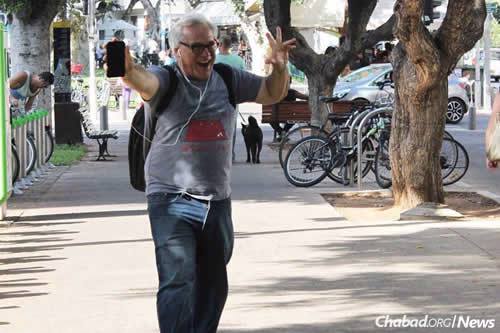Three people in Tel Aviv were killed and two injured last Saturday night when a driver from Ra’anana, in central Israel, lost control of his car and careened into a street-side restaurant. The accident, likely due to a heart attack, wound up killing the car’s driver, as well as Menashe Raz of Ashdod, who was standing on the sidewalk; and Alan Weinkrantz, 63, a public-relations maven and consultant for tech start-ups.
I first met Alan six years ago at #140Conf, a series of conferences hosted by Voice-Over-IP pioneer and Internet entrepreneur Jeff Pulver. Nine of us gathered in a backroom of the 92nd Street Y on Manhattan’s Upper East Side for minchah, the afternoon prayer services. Alan joined us as the 10th.
In the years since, Alan became a dear friend. Every year at #openShabbat, the annual Friday-night dinner my wife Chana and I make at the SXSW conference in Texas, he would come, bringing friends and happiness and hugs. During stopovers in New York, he would visit us at our home in the Crown Heights neighborhood of Brooklyn.
Born in Dallas and a resident of San Antonio for much of his life, Alan had a warm Texas twang and bright smile that accompanied him as he criss-crossed the world for three decades, advocating for the future of human communications and helping tech startups find their voice. In recent years, he divided his time between San Antonio and Israel. As he traveled, he would make a point of visiting Chabad centers around the world. He would take great joy in introducing himself to the local Chabad-Lubavitch rabbi and see how quickly the rabbi could name the leaders of his hometown Chabad: Rabbi Chaim Block and Rabbi Yossi Marrus.

‘A Mission to Do Good’
On a particular trip to Crown Heights, Alan and I toured WLCC, a small back-room space at 770 Eastern Parkway (Lubavitch World Headquarters), where the Rebbe’s talks were broadcast live throughout the world. Alan was amazed at the assembly of phone lines and routers, commenting: “This is really the world’s first social network!” While standing there, an elder Chassid asked Alan if he owned a pair of tefillin. Admitting that he no longer had the pair he received at his bar mitzvah, Alan decided on the spot that he would purchase another pair that day. If there was a mitzvah that he could do, how could he let it pass?
Alan and I would spend time practicing wrapping the black straps over Skype, so that no matter where in the world he was—be it Jerusalem, Berlin or Silicon Valley—he could “connect.” During one of those sessions, he told me with pride the nachas he felt he was giving his illustrious forbearer, Rabbi Yechezkel Landau of Prague, author of the Nodeh B’Yehudah. “Somehow,” he said, “I just know that Zeide Yechezkel is just looking down and smiling.”
What I found particularly impressive about Alan was not the sheer number of people he touched—after all, he was an expert networker—but rather, the closeness everyone who met him felt, after even a brief meeting. When you communicated with Alan in any way—online, phone or in person—you became a friend (and often, more like family).
In a post on the online publishing platform Medium that he wrote after spending Rosh Hashanah at Chabad in Berlin, he related: “I was honored to share my feelings about being among family, no matter where in the world I may be. ... We’re one giant family with a mission to do good and carry on.”
Alan loved technology, photography, music, and above all, his two children: his daughter Lauren and his son Aaron.
Alan’s presence will be sorely missed, but the connections he forged, bringing so many people together in so many different places, will go on. As Alan used to conclude his conversations with me, I wish him, “as they say in Texas, ‘Shalom.’ ”




Start a Discussion